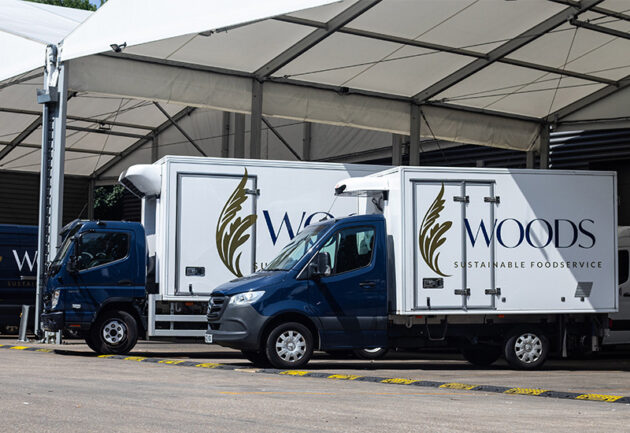
Woods speeds up sustainability journey
Already a champion of sustainability, Woods Foodservice has taken further steps towards being Net Zero by 2030
Woods Foodservice has accelerated its sustainability journey by replacing a third of its delivery vans with electric vehicles.
The new fleet includes custom-built vans featuring bodies made from recycled and recyclable materials, solar panels and the ability to save almost two tonnes of carbon emissions per vehicle annually. These bespoke electric vans, hitting the road in December, mark a first in the UK foodservice sector.
In the past year, Woods Foodservice has also introduced fully electric forklifts, now operational across all depots, and electric corporate cars. It also transitioned to washable and reusable crates for fresh produce deliveries, cutting packaging waste by up to 40%.
“Sustainability is not just important to our customers, it is at the heart of everything we do,” says Darren Labbett, Woods Foodservice managing director. “With ambitions to be a net zero contributor by 2030, this is another major step in the right direction.
“We’re still on our sustainability journey and we are passionate about minimising our environmental impact. These upgrades demonstrate our commitment to promoting greener practices across all aspects of our operations while maintaining high standards of service and efficiency for our customers.”
The Confex member is also introducing five brand-new 7.5-tonne lorries to support longer journeys, particularly for deliveries to outer London areas, in the South West and northern regions, saving 62,400 miles a year.
The lorries have been designed to handle larger deliveries, including ambient, chilled and frozen goods thanks to separate temperature-controlled compartments.
The adoption of biodiesel for its conventional fleet further underlines Woods’ commitment to reducing fossil fuel use. The company has installed a biodiesel container at its Uxbridge headquarters to facilitate the transition and support its ultimate goal of converting its entire fleet to electric and low-emission vehicles.
Categories Green Wholesale Collective









